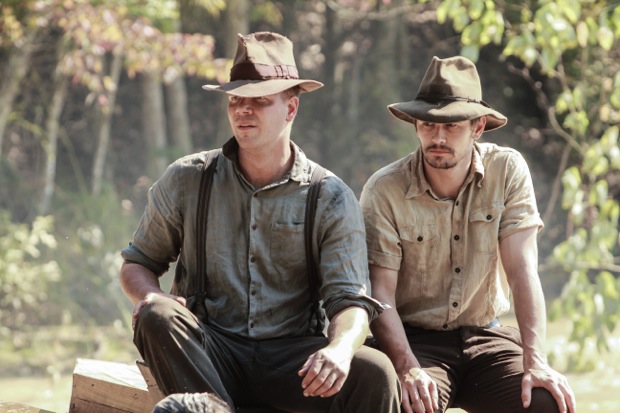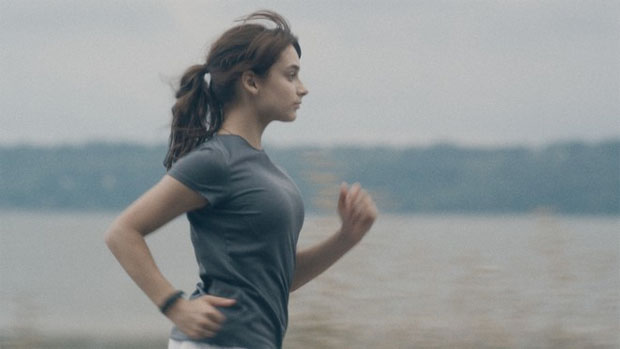 Back to selection
Back to selection
Cannes 2013: Franco’s As I Lay Dying and Robichaud’s Sarah Prefers to Run
 As I Lay Dying
As I Lay Dying While I was in graduate school, many years ago, I wrote a master’s thesis on William Faulkner’s As I Lay Dying and have always loved the novel’s rich layering of the multiple, fragmentary points-of-view. Faulkner used to this technique — which he once described as “thirteen ways of looking at a blackbird” — to depict the Bundren family’s mock epic journey from their little hamlet to the county seat of Jefferson, where they have promised to bury the family’s matriarch, Addie. Because of my knowledge of the novel, I approached James Franco’s adaptation with a great deal of trepidation. Add to that pre-existing concern Franco’s sometimes cloying star persona and the crush of Franco fans that clamored to push their way in to see the film, even on a second-day screening, and my apprehensions only deepened.
That said, I’m hardly a purist when it comes to adaptations. In fact, many of the best adaptations complicate and even challenge our original interpretations of the original text. So, despite those concerns, I took a chance on Franco’s As I Lay Dying and ended up finding myself finding Franco to be a relatively keen reader, managing to stay true in spirit both to Faulkner’s darkly comic narrative and to his modernist, often fragmentary experiments with point-of-view. The film accomplishes this depiction of multiple points-of-view in part through an innovative use of split-screen techniques that allowed Franco to show two different perspectives on the same event at the same time.
This technique also permits Franco to depict two events that are connected, whether due to the fact that they are happening simultaneously or because of an emotional resonance between them. This is, perhaps, most powerfully illustrated during the funeral scene. Two of Addie’s sons, Darl (Franco) and Jewel (Logan Marshall-Green), are unable to return to Addie’s funeral due to a downpour that washes out the dirt roads and leaves their wagon stuck in a ditch. But Darl, who is intuitive and who seems to have an innate ability to see things even when he is not present, seems to “hear” the mourners singing “Shall We Gather at the River” (a song that involves some rather sly foreshadowing).
Other scenes depict members of the Bundren family directly addressing the camera, relating their histories and, quite often, their secret motivations for traveling to Jefferson. In each case, characters meditate on the nature of language, about the failure of words in many cases to capture the true meaning of the objects they represent. But while the split screens and subtle editing help to establish the film’s reflections on time, memory, and perception, in places, the music was overly manipulative in its attempt to create a dream-like atmosphere in which we are meant to be entering the psyches of the different members of the Bundren family.
With that caveat, Franco’s direction generally works well, especially given the complexity of the material he is adapting. He manages to get the film’s essential story, while balancing that with Faulkner’s concerns about perspective. He also teases out a theme that is often missed when discussing the novel — the selfishness and secrecy that seems to permeate each of the characters, a theme that is tied to the poverty of the Bundren family (although it’s not explicitly addressed in either the film or novel, the story takes place during the heart of the Great Depression). The film’s performances also work incredibly well. Franco brings a subtle touch to the introspective Darl, while Tim Blake Nelson is both funny and frightening as the toothless (literally and figuratively) patriarch, Anse.
Faulkner purists may be reluctant to embrace this film, and people who have not read As I Lay Dying (or who know very little about Faulkner’s work) may be bewildered by the storytelling techniques, but Franco has offered a compelling interpretation, one that does justice to the novel, even while looking at it through a somewhat refracted lens.

Soon after she arrives at McGill University to join the track team, a journalist for the student newspaper asks Sarah Lapage why she is on the team. After a brief pause, she responds simply, “I like to run.” Sarah’s answer captures something essential about the lead character in Chloe Robichaud’s Canadian Un Certain Regard entry, Sarah Prefers to Run, a low-key character study that never overplays the emotions of its characters.
For Sarah, running seems to be Less about competition with others — or about her connections with a team — than about Sarah’s own internal experience of running. She only mentions that she won a track competition after her mother specifically asks, and tells her interviewer that her main concern as a runner is to beat her own best times, which she jots down with an ink pen on her palm. But despite this focus on running, the film deftly avoids clichés about the big race or about triumphing over incredible odds. Instead, Sarah Prefers to Run is a quiet examination of the title character’s singular focus on her life and craft as a runner.
With few other interests, Sarah decides — without telling her mom — that she’d like to attend McGill University on a track scholarship. In order to make ends meet, she agrees to share an apartment in Montreal with the dishwasher at the restaurant where she works, Antoine, whom she barely seems to know. Unlike Sarah, Antoine is outgoing, the kind of guy who can sing anything — Bob Dylan, Bon Jovi — without any kind of self-consciousness, which seems to make him the ideal person to help Sarah open up to others. The drama between the couple evolves organically, creating tensions that are both highly convincing and relatively uncommon in most films.
The film also gradually introduces to us the fact that Sarah has a heart condition that could endanger her career as a runner, forcing her to make a choice about whether she will take the risk of continuing to run. While this plot device might seem contrived, it is actually central to the film’s existentialist themes. As with all other decisions that Sarah faces, it is a choice that she makes individually, and this decision is carried in part due to Sophie Desmaris’s powerful performance, which brings a tremendous subtlety to what could have been an overly simplified character. Jean-Sébastien Courchesne adds an effective comic touch as Antoine, her roommate. Robichaud’s direction is subtle and allows the drama to unfold through small gestures that reveal Sarah’s personality and the meaning of her choices, making this one of the more engaging films I caught during the first week of the festival.
